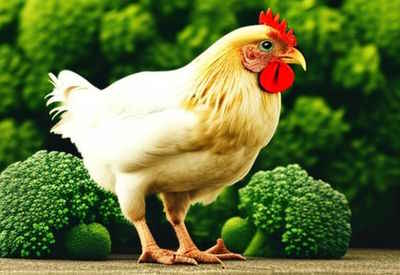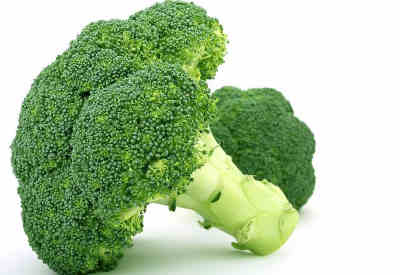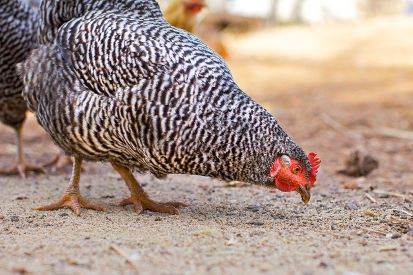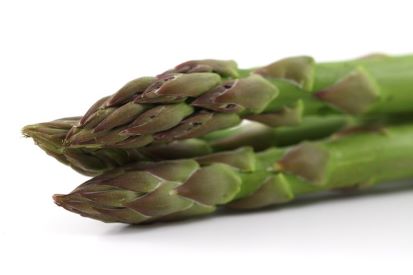Can chickens eat broccoli? It’s a common question among chicken owners, and the answer is yes. Not only can chickens eat broccoli, but they will love it! Broccoli offers lots of nutrients that are beneficial to your feathered friends.
Your chickens can safely eat all parts of the broccoli plant. This includes leaves, stems, flowers, and florets. You can feed them raw or cooked broccoli; it doesn’t matter either way. However, like most treats, only feed your chickens a little broccoli in one sitting. A few pieces here and there should be enough for them to enjoy without feeling uncomfortable after eating too much.
This article will cover the nutritional benefits of feeding chickens broccoli, how to feed it, and how much is safe for them to eat.

Can chickens eat broccoli?
Broccoli is safe for chickens to eat and is one of their favorite treats. They will love snacking on the crunchy leaves and florets and nibbling on the stems. Not only is it safe for them to consume, but it is also packed with nutrients.
Broccoli offers lots of nutrition for our feathered friends. It offers plenty of vitamins A and C, iron, calcium, and fiber. Vitamin C helps improve their immune system, while iron helps with red blood cell production. Calcium helps keep their bones strong, while fiber aids digestion. All these nutrients combined make broccoli a great choice for an occasional treat for your chickens.
[ChickenAffiliate]
The benefits of eating broccoli for chickens
Broccoli is a delicious, nutritious vegetable that can benefit your chickens. Read on to learn how broccoli can help boost your chickens’ health and performance.
Nutrition
Broccoli is packed with essential vitamins and minerals, including Vitamins A and C, folic acid, potassium, and iron. Feeding your chickens broccoli regularly will ensure they get all the nutrients they need to stay healthy.
Digestive Health
Broccoli contains fiber, which helps chickens better digest their food and keeps their digestive system running smoothly. This means less waste produced by your birds, leading to a cleaner coop in the long run.
Weight Management
The fiber in broccoli also helps chickens feel fuller longer, which can help them maintain a healthy weight. Eating too much can lead to obesity in chickens, just like in humans – so ensure you provide them with plenty of fresh green vegetables like broccoli to keep their weight in check.
Egg Quality
If you’re looking for tasty eggs with bright yellow yolks, feeding your hens broccoli is a great way to get there. The vitamin A found in this vegetable will give those egg yolks an extra boost of color and flavor that will make them stand out from the rest.
Immunity Booster
Just like humans need vitamin C to stay healthy and fight off illnesses, so do chickens. The vitamin C found in broccoli can help strengthen their immune systems against common chicken diseases like coccidiosis or bumblefoot.
Providing your birds with a steady supply of this veggie will go a long way towards keeping them safe from harm.
Things to watch out for when feeding broccoli to chickens

Broccoli is a tasty vegetable often recommended by chicken owners as an occasional treat. Still, there are some things you should watch out for when feeding this veggie to your feathered friends.
Too Much Can Be Unhealthy
Like any other food, too much of a good thing can be unhealthy – and broccoli is no exception. Try not to feed your chickens more than one cup of broccoli, as they could suffer from digestive issues if they eat too much.
Also, ensure that the broccoli isn’t covered in oil or seasoning before you give it to them.
Cut Up the Broccoli
Even though chickens have powerful beaks, they still might have trouble eating large pieces of broccoli. To ensure they get all the nutrients without choking hazards, cut the veggie into smaller pieces before offering it up as a snack.
This will also help them digest it better so they can get all the benefits of eating this superfood.
Watch Out for Pesticides
As you would with any other food item you give your chickens, ensure that any raw vegetables are free from pesticides or other harmful chemicals before serving them as snacks or treats.
Always buy organic produce whenever possible to ensure your birds get safe and healthy snacks.
How often should chickens eat broccoli?
Feeding your chickens broccoli can be a great way to give them a nutritious treat on occasion. It is recommended that broccoli make up no more than 10% of their diet, so it’s best to feed it in moderation.
For best results, broccoli should be fed to chickens 2 or 3 times per week. If your chickens tend to overeat this high-fiber vegetable, reducing the frequency of its introduction into their diet may be wise. Remember that a balanced diet is important for healthy, happy chickens.
How to prepare broccoli for feeding to chickens

Leafy greens, like broccoli, are a great way to give your chickens the nutrition they need. But how do you prepare broccoli so that your chickens can enjoy it? Let’s look at some guidelines for feeding broccoli to your chickens.
Wash First
Before giving broccoli to your chickens, be sure to wash it thoroughly with cool water. This way, you can remove any dirt or bacteria that may be present on the surface of the vegetable – it’s important to watch what goes into your chickens’ mouths. Once you’ve washed the broccoli, you’re ready for the next step.
Chop Into Small Pieces
Once the broccoli is clean, cut it into small pieces to make it easier for the chickens to eat. You can chop it up as finely as you like – just be sure there are no large chunks left behind. They could become a choking hazard for your birds if they’re too big.
Can Be Served Cooked Or Raw
Whether cooked or raw, both options have their benefits when preparing broccoli for chickens. If you serve it cooked, it will be softer and easier for them to digest. On the other hand, if you serve it raw, they get all of its nutritional benefits without worrying about digestion issues due to overcooking. The choice is yours!
Serve It Plain
For your chickens to receive all of the nutritional benefits from their broccoli, try serving plain whenever possible. That means no added salt or pepper and no butter or oil. Any additional ingredients could cause digestive issues in your flock and should be avoided at all costs.
Remove Any Uneaten Pieces
After feeding time, ensure that any uneaten pieces of broccoli have been removed from the coop before bedtime rolls around. Cleanliness helps prevent diseases and ensures that none of those pieces end up being snacked on during the night by undesirables like mice and rats.
Can baby chickens eat broccoli?
Many people wonder if broccoli is suitable for baby chickens as part of their diet. The answer is yes, but only in moderation. Baby chicks need a balanced diet that includes vegetables, but they should not eat too much broccoli as it is higher in fiber than the grains and proteins that make up the bulk of their diet.
If you give your baby chickens broccoli, chop it or grate it into small pieces to help them digest it better due to their delicate digestive systems.
What other vegetables can chickens eat?

Broccoli is a popular vegetable among chickens, but did you know there are many other vegetables that your feathered friends can enjoy? There are plenty of options to ensure your chickens have a healthy and varied diet. Let’s explore what other vegetables chickens can snack on.
Asparagus
Asparagus is a great veggie for chickens because it has many health benefits. This nutrient-dense vegetable provides an abundance of vitamins A, C, E, K, and B6 and fiber and folate.
And not to mention just how much flavor it adds to their meals. Asparagus also has anti-inflammatory properties, which can help keep your chicken’s immune system functioning properly.
Read More: Can Chickens Eat Asparagus? 5 Awesome Benefits
Cabbage
Cabbage is a wonderful source of vitamin C and is especially beneficial for older birds who need more energy. It contains minerals like calcium, magnesium, potassium, and iron, which help absorb nutrients from food in the body.
Plus, cabbage is low in calories, so you don’t have to worry about your bird getting too full after eating it. Make sure you feed them fresh cabbage, as it tends to spoil quickly when cooked.
Read More: Can Chickens Eat Cabbage? 5 Excellent Benefits
Green Beans
Green beans are an excellent addition to any chicken’s diet because they’re high in protein and contain essential vitamins like A and K. They also provide important minerals such as magnesium, manganese, and copper, which help with bone development and digestion.
Green beans are also packed with dietary fiber, which helps keep your chicken feeling full longer after eating them. Plus, they’re easy to prepare! Just steam or boil the beans before serving them for your bird’s mealtime pleasure.
Read More: Can Chickens Eat Green Beans? 4 Important Benefits
Brussel Sprouts
Brussel sprouts may be small, but they pack quite the nutritional punch. They’re rich in vitamin C and provide important minerals such as calcium and iron for proper bone development in chickens.
These little green veggies also offer omega-3 fatty acids, promoting healthy skin and feathers while helping fight off infection-causing bacteria.
Read More: Can Chickens Eat Brussel Sprouts? 5 Fantastic Benefits
Peas
Peas are an excellent source of protein and fiber, making them a perfect snack for chickens. They also have plenty of vitamins like A and K and minerals like calcium and magnesium, which are essential for healthy bones and joints.
Plus, peas provide the added benefit of being high in antioxidants which help protect your bird’s cells from free radical damage.
Read: More: Can Chickens Eat Peas? 5 Amazing Benefits
How to give chickens a healthy and balanced diet
If you’re new to keeping poultry, your first task is understanding how to feed them properly. Luckily, providing chickens with a healthy diet isn’t complicated or expensive – just read on for some tips and tricks.
Start With The Basics: Layer Feed & Scratch Grains
Layer feed is specially formulated for egg-laying chickens; it provides all the nutrients they need to stay healthy and lay eggs. It usually comes as pellets or crumbles, but if you can find whole-grain layer feed, that’s even better, as it’ll encourage your chickens to scratch around and forage naturally.
These days, organic layer feeds are also available for those who want the best for their birds. As well as layer feed, it’s also important to provide your chickens with scratch grains like cracked corn and wheat – they love this stuff! It’s an excellent energy source but doesn’t contain all the essential nutrients they need, so they should be fed in addition to their layer feed rather than instead.
Supplement Their Diet With Treats & Other Foods
Chickens love treats! They especially go crazy over greens such as lettuce, kale, and broccoli leaves – pretty much anything green in your kitchen will be welcomed by your hens.
You can also try feeding them fruits like watermelon (a personal favorite), apples, and bananas – make sure you remove any uneaten fruit from the pen before it starts to rot.
Vegetable scraps are another great treat for your flock; carrots, sweet potatoes, and squash are popular with backyard chickens everywhere.
Protein
It’s also important to remember protein sources – you can supplement their diet with cooked meat or fish scraps. Mealworms are another fantastic source of protein that chickens adore – these can be sourced from most pet stores or ordered online in bulk if needed.
Just remember that treats should only make up 10-20% of their daily diet – they still need plenty of good quality layer feed too.
Can chickens eat broccoli – final thoughts
As you can see, there are many benefits to feeding your chickens small amounts of broccoli as a treat here and there. Not only do they love the taste, but it also provides them with essential vitamins and minerals that keep them healthy and happy.
So go ahead – give some fresh or lightly cooked pieces of broccoli to your flock today!
Related Articles:
